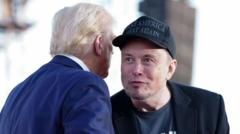Billionaire industrialist Elon Musk has been appointed to lead the newly established Department of Government Efficiency (Doge) in the incoming administration of President Donald Trump. Announced via social media, President Trump stated that Musk and former presidential candidate Vivek Ramaswamy are charged with overhauling government inefficiencies, including cutting unnecessary regulations and reducing federal spending.
Musk, known for his leadership in the tech and automotive sectors, has argued that the US government’s budget could be reduced by "at least" $2 trillion from its current approximately $6.5 trillion. He has also suggested significant cuts to the federal workforce. Ramaswamy has proposed the elimination of various federal agencies, including the IRS and the Department of Education.
Musk's management style, exemplified by his controversial $44 billion acquisition of Twitter, now known as X, may shape his governance strategies in Doge. Upon taking over Twitter in late 2022, Musk dramatically reduced its workforce from about 8,000 employees to merely 1,500. His approach prioritized aggressive cost-cutting and revenue-generating tactics, such as introducing subscription models for account verification, despite facing backlash for promoting misinformation on the platform.
Experts note that Musk's role in Doge may significantly influence Trump’s administration and its regulatory strategies. Thomas Gift, a director at the Centre on US Politics, posits that Musk’s prior experiences in minimizing bureaucracy will likely guide his actions within the federal government, albeit without formal authority.
Musk's motivations may also be tied to his desire for a more favorable regulatory environment for his enterprises, including Tesla and SpaceX, which have faced multiple governmental restrictions. His critiques of regulations affecting labor rights at Tesla and recent disputes with the Federal Aviation Administration demonstrate his frustrations with bureaucratic oversight, further fueling his commitment to government reform.
Furthermore, Musk's endeavors in crypto deregulation hint at potential monetary gains from market volatilities during Trump's presidency. He is often seen publicly advocating for less government intervention in the tech and space sectors, which aligns with Trump's deregulatory agenda.
The symbolic weight of his position is significant given Musk’s deep financial and political investments in Trump’s presidential campaign. Reports estimate that he donated $200 million to Trump’s 2024 bid and has participated in major campaign events.
While some scholars emphasize Musk's personal stake in regulatory changes, they acknowledge his ideological opposition to government overreach. His relationship with Trump appears transactional; however, it is marked by real influence as evidenced by his involvement in crucial discussions regarding the war in Ukraine.
In conclusion, Musk's appointment as Donald Trump's efficiency tsar promises to reshape US governance amidst a backdrop of intertwined interests and a shared vision for a less regulated governmental landscape.



















